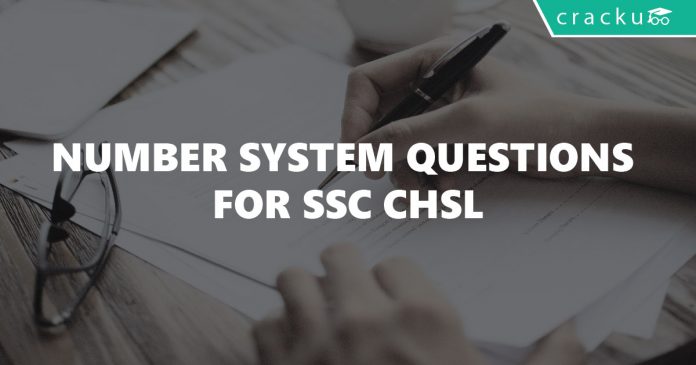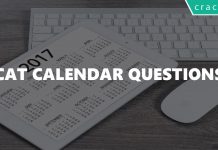Number system is important topic in quantitative aptitude section of SSC CHSL and CGL exams. You can download the SSC CHSL number system questions and answers PDF.
Number System Questions for SSC CHSL Exam:
20 SSC CHSL (latest pattern mocks) – Rs. 117
You can practice SSC CHSL English question papers
Download SSC CHSL 2018 Syllabus PDF
Download All SSC CHSL Questions Topic wise PDF
Take Free SSC CHSL Mock test 2018
Question 1: What smallest number should be added to 2957 so that the sum is completely divisible by 17 ?
a) 9
b) 2
c) 3
d) 1
Question 2: Which of the following numbers is not a prime number?
a) 731
b) 227
c) 347
d) 461
Question 3: The largest 5 digit number exactly divisible by 95 is
a) 99936
b) 99935
c) 99940
d) 99933
Question 4: If the number 583_437 is completely divisible by 9, then the smallest whole number in the place of the blank digit will be
a) 4
b) 5
c) 3
d) 6
Question 5: The sum of all prime numbers between 30 and 42 is
a) 103
b) 109
c) 105
d) 104
Question 6: What smallest number should be added to 2401 so that the sum is completely divisible by 14 ?
a) 8
b) 7
c) 4
d) 5
Question 7: Which of the following numbers is completely divisible by 99?
a) 51579
b) 51557
c) 55036
d) 49984
Question 8: If in a two digit number, the digit at unit place is z and the digit at tens place is 8, then the number is
a) 80z + z
b) 80 + z
c) 8z + 8
d) 80z + 1
Question 9: What least number must be added to 1039, so that the sum obtained is completely divisible by 29?
a) 4
b) 5
c) 8
d) 6
Question 10: Which of the following numbers is not a prime number?
a) 197
b) 313
c) 439
d) 391
Solutions for Number System Questions for SSC CHSL:
Solutions:
1) Answer (D)
If 2957 is divisible 17, => 2957 = 17 \times 173 + 16
Quotient is 173 and remainder is 16
Thus, smallest number that should be added to 2957 so that the sum is completely divisible by 17 = (17 – 16) = 1
=> Ans – (D)
2) Answer (A)
Prime Factorization of 731 = 17 \times 43
For all the remaining numbers, the only factors are 1 and the number themselves.
Thus, only 731 is not a prime number.
=> Ans – (A)
3) Answer (C)
Largest 5 digit number = 99999
If 99999 is divided by 95, => 99999 = 95 \times 1052 + 59
Quotient is 1052 and remainder is 59
Thus, largest 5 digit number which is divisible by 95 = 99999 – 59
= 99940
=> Ans – (C)
4) Answer (D)
Number : 583_437
Let the missing digit = $$x$$
=> Sum of digits = 5 + 8 + 3 + $$x$$ + 4 + 3 + 7 = 30 + $$x$$
Clearly, sum of digits is between 30 and 39. The only number divisible by 9 and which lies between 30 and 39 is 36
=> $$30 + x = 36$$
=> $$x = 36 – 30 = 6$$
=> Ans – (D)
5) Answer (B)
Sum of prime numbers between 30 and 42 :
= 31 + 37 + 41
= 109
=> Ans – (B)
6) Answer (B)
Factorizing 2401 = 14 \times 171 + 7
Thus, on dividing 2401 by 14, the remainder is 7
The number that must be added to 2401 so that the sum obtained is completely divisible by 14
= 14 – 7 = 7
=> Ans – (B)
7) Answer (A)
For a number to be divisible by 99, it must be divisible by 9 and 11
(A) : 51579 = 5 + 1 + 5 + 7 + 9 = 27 which is divisible by 9 and also by 11
(B) : 51557 = 5 + 1 + 5 + 5 + 7 = 23 which is not divisible by 9
(C) : 55036 = 5 + 5 + 0 + 3 + 6 = 19 which is not divisible by 9
(D) : 49984 = 4 + 9 + 9 + 8 + 4 = 34 which is not divisible by 9
Thus, only option (A) is divisible by 99
8) Answer (B)
Digit at unit’s place = z
Digit at ten’s place = 8
=> 2-digit number = $$(10 \times 8) + (1 \times z)$$
= 80 + z
=> Ans – (B)
9) Answer (B)
Factorizing 1039 = 29 \times 35 + 24
Thus, on dividing 1039 by 29, the remainder is 24
The number that must be added to 1039 so that the sum obtained is completely divisible by 29
= 29 – 24 = 5
=> Ans – (B)
10) Answer (D)
Among the given numbers, there are no factors of 197, 313, 439 other than 1 and the numbers themselves.
391 = 23 \times 17
=> 391 is not a prime number.
=> Ans – (D)
Number system questions and answers for SSC CHSL exam PDF are given here, you can solve more SSC questions





![How To Manage Time In CAT Exam? [Section-wise Tips] How to manage time in CAT exam ?](https://cracku.in/blog/wp-content/uploads/2018/09/fig-03-09-2018_10-54-46-218x150.jpg)
[…] Number system […]